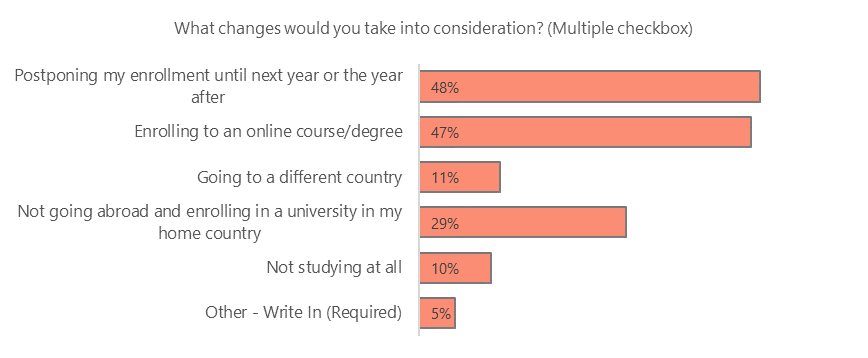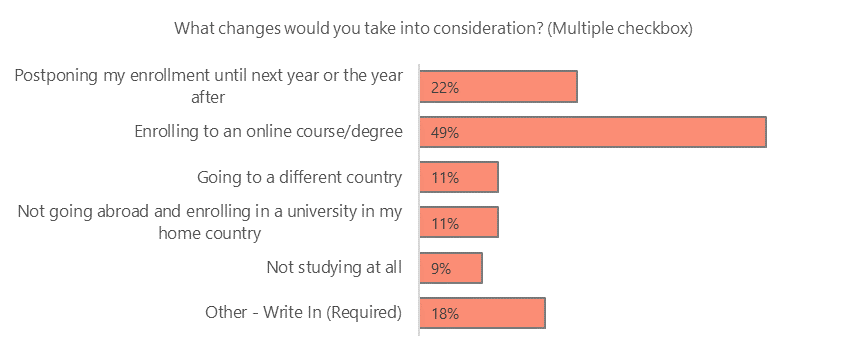The Impact Of COVID-19 on International Students Perceptions – Part 2: the perception gap between studying at home and abroad
While the virus still ravages Europe and exacts its toll on North America, all of the great global study destinations appear to be in lockdown. Campus activities in the UK, Germany, the US, Canada, and Australia have been swiftly suspended.
This week we took a look at students studying abroad compared to their more domestic counterparts:
- Are students all the same?
- How did the virus outbreak change the study plans of international students?
- What do international students expect in universities?
This study is meant to be an ongoing observation of how the virus outbreak influences student perceptions: last week we covered the different concerns of students that will start studying within the next six months against later applicants.
Who took part in the survey?
Since Friday 20 March Studyportals has been running an online survey among international students to find out what their perceptions are on COVID-19 and how it may impact their study abroad plans. Studyportals will continue collecting answers and keep weekly updates on the results of the questionnaire.
This survey has been administered to prospective students worldwide and has thus far collected 600 complete answers. For this analysis, we consider the respondents that reported to be already studying: 70% of them are studying in their home countries (280); while 30% reported to be studying abroad (122). The numbers decrease in the analysis because we recorded also partial results.

What are students saying?
Students studying in their home country constitute the bulk of respondents and are concerned that the virus outbreak will affect their studies. Their fears revolve around practical issues: travel restrictions, budget constraints, and being prevented from finishing their current studies.
The answers of students abroad do not diverge from the other segment. Nevertheless, they are more inclined on thinking that their travel options will be limited and are slightly more worried about their financial position, as they expect either their own savings or their parents’ savings to decrease because of the virus.
Are students abroad any different from their domestic counterparts?
When it comes to perceptions these two groups are highly divided. Students studying abroad are way more decided in their response to the virus, and way more pessimistic: 76% are more likely than not to be affected by the virus outbreak, against 64% of students studying in their home countries.
| Students studying at home |
 |
| Students studying abroad |
 |
Furthermore, respondents who are studying abroad are more likely to have already their plans adjusted for the emergency. More specifically, a larger share – 41% against 32% of students studying in their home countries – changed their study plans due to the virus outbreak.
Of this group, most are considering enrolling in online courses or degrees, while other options are not so popular. Students studying in their home countries, on the other hand, are also considering postponing their studies, or simply not going abroad at all, sending a worrying sign to international student mobility.
It is important to point out that respondents who modified their study plans are still a minority of the whole group. Student perceptions are changing as the virus spreads, and a more detailed analysis will duly follow on Studyportals.
| Respondents studying in their home countries | |
 |
 |
| Respondents studying abroad | |
 |
 |
What can universities do?
Understanding your students, current and prospective is the most relevant action. It is important to understand that while there are concerns and pains shared by the whole student population, certain segments definitely need special care.
Students who are studying in their home countries can afford to delay their enrolments, whereas students already studying abroad are more conscious of the online alternatives in their studies. Students abroad seem to be more open to services online and distance learning and not considering moving back to home countries.
It appears that students who are already studying abroad are more interested in solutions as moving lectures online, offering individual tutoring, and counselling and support. Student services online are extremely welcomed when you are far from home.

What both groups would like to have from universities are two resources that are often overlooked: time and flexibility. This is related specifically to extending the application deadline, but they would also welcome processing applications even when certificates are missing. This may seem a general plea from applicants but at a time where language test centres are closed, showing extra flexibility can pay dividends in the future. Higher education institutions seem amenable to these pleas, but universities are well-advised to manage expectations as visa procedures may not be flexible enough, resulting in students not getting their visas in time.
If a lot of your international students had experiences studying abroad, then you probably want to learn more about their plans. They probably will try not to miss the upcoming semester, even if studying online is not their default choice in normal conditions. Nevertheless, higher education is not under normal circumstances, and listening to students is key in planning for the future.
If you want to keep track of student interest, we are preparing an updated public dashboard where you can spot the developments of student demand in real-time.
For more updates, follow us!





